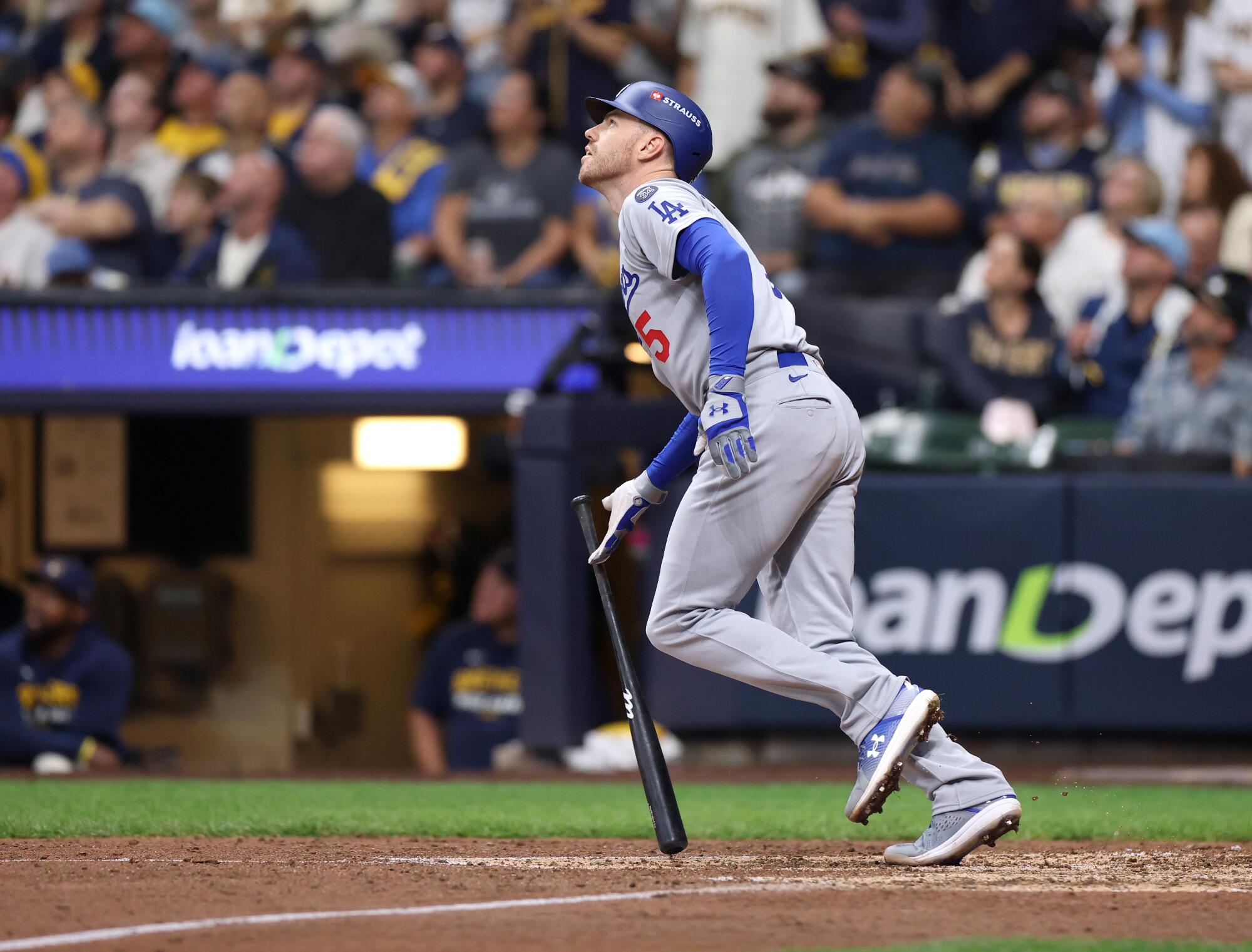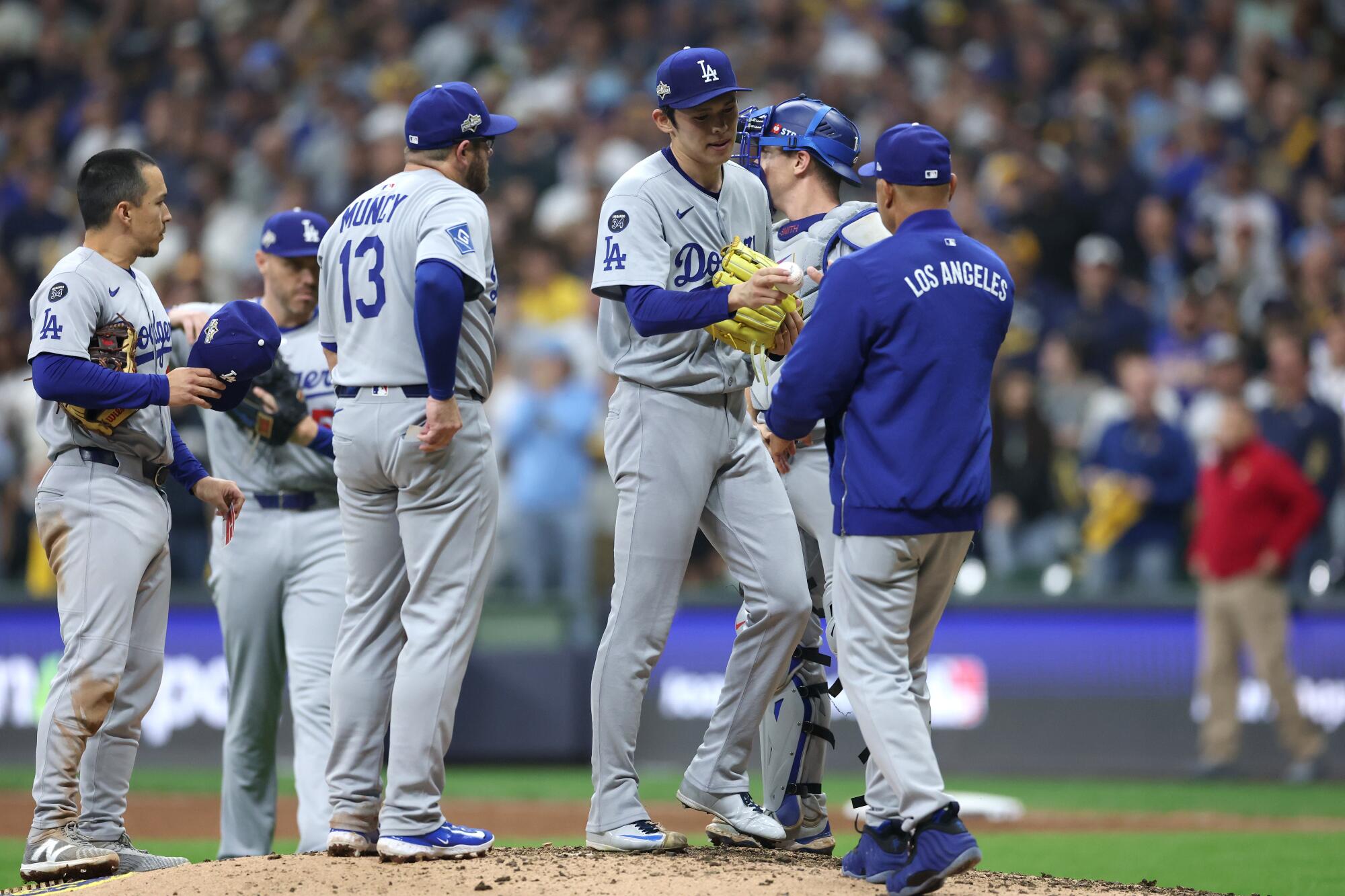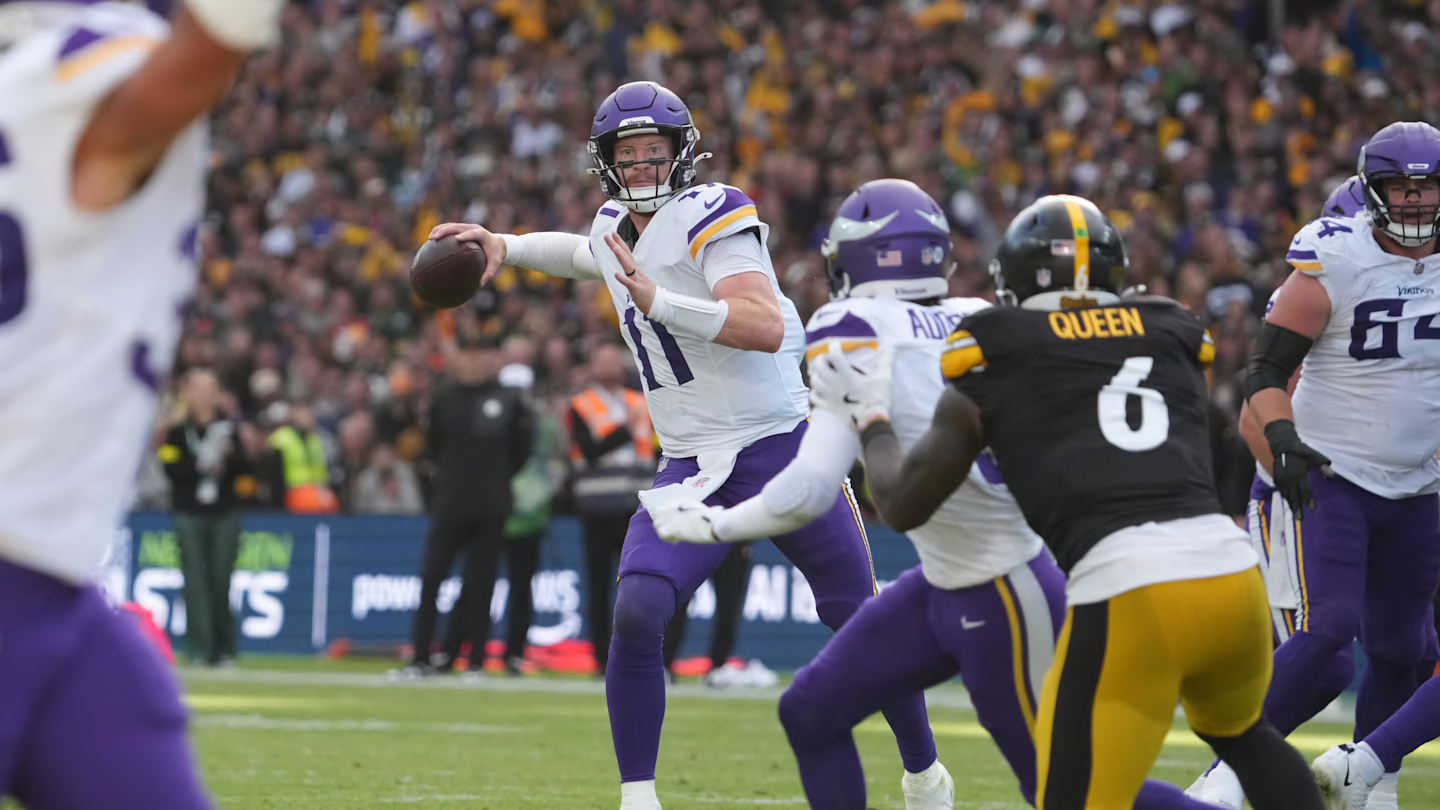MILWAUKEE — The reason the Milwaukee Brewers are in the National League Championship Series is because of plays like the one that ended the fourth inning Monday night.
A strange, one-in-a-million, 400-foot double-play in which one Brewers fielder made a spectacular defensive effort, and another never lost awareness of a wacky situation — highlighting the underappreciated skillset and sound fundamentals that made them baseball’s winningest team this season.
The reason the Dodgers are here, however, is because of how they can respond to adversity — settling the panic with their dominant starting pitching, rallying at the plate with their star-studded lineup and suffocating an opponent with a record $415-million payroll’s worth of talent.
In their 2-1 win in Game 1 of the NLCS at American Family Field, that was ultimately what made the difference.

The evening’s most memorable moment might have been that fourth-inning cluster, when the Dodgers had the bases loaded with one out, only to come up empty when Max Muncy had a potential grand slam robbed (but, crucially, not caught cleanly) and two Dodgers were retired on forceouts at home plate and third base.
But, the most important contributions came after that, with Freddie Freeman’s home run in the sixth inning giving the Dodgers the lead, and Blake Snell’s scoreless eight-inning, one-hit, 10-strikeout master class ensuring they wouldn’t relinquish it — even with some heartburn from the bullpen at the end.
“Obviously, there were some crazy things that happened,” manager Dave Roberts said. “It’s not going to come easy.”
But, “for us to find a way to get out of that,” Muncy added, “it’s huge.”
Muncy was in the middle of the night’s craziest play, when he came to the plate with the bases loaded and one out in the fourth inning.
What followed was a confounding, and nearly consequential, disaster. One both self-inflicted by the Dodgers’ lack of awareness, and compounded by the Brewers’ ability to do the little things so well.

The Milwaukee Brewers pulled off a wild double play against the Dodgers in the fourth inning of Game 1 of the NLCS.
As Muncy’s ball soared to the wall, Brewers center fielder Sal Frelick jumped, got a glove on it, and then — at least it seemed initially — caught it on a bobble. At third base, Teoscar Hernández tagged up once, then again, before finally breaking for home plate as the Brewers turned a relay play in.
What no one on the Dodgers noticed in the moment: Left field umpire Chad Fairchild waving his arms in the outfield, signaling (correctly, as replay would later show) that the ball had bounced off the top of the wall before Frelick finally secured it. That meant, instead of a sacrifice fly situation, a force play was suddenly on for the defense.
Thus, when catcher William Contreras caught the throw home just ahead of Hernández’s slide, Hernández was out even without a tag. And as the other Dodgers runners stood motionless on base — still thinking Frelick had cleanly made the catch — the ever-aware Contreras ran over to third himself and stepped on the bag, forcing out Will Smith after he had failed to advance from second.
“I’m still kind of confused as to what all went down,” Muncy said.
“All of a sudden, you turn around and there’s runners everywhere,” crew chief and first base umpire James Hoye added to a pool reporter.
The big mistake on the play was Hernández’s decision to re-tag third before racing home, a superfluous move thanks to a quirk in MLB’s rulebook. Even if Frelick had made the catch cleanly, Hernández could have left the base as soon as the ball first hit Frelick’s glove (similar to a bobbled sacrifice fly the Dodgers successfully executed in a game against the New York Mets earlier this season).
Instead, Hernández’s delay allowed the throw home to beat him. Afterward, Roberts acknowledged that his outfielder, who did not speak to reporters postgame, “just had a little bit of a brain fart.”
“Teo knows the rule,” Roberts said. “He owned it.”

The other problem was that neither Smith nor third base coach Dino Ebel apparently saw Fairchild, who was out of their sight line deep in the outfield, signal that the ball had not been caught, leaving Smith standing on second as Contreras went to force him out at third.
The Dodgers did challenge the play, but there was no changing the call.
In the scorebook, it went down as a 400-foot, ground-into-double-play.
“That’s really frustrating,” Smith said. “That was really close to being 4-0.”
For a brief moment, it left the team on the verge of falling into a familiar Brewers’ trap: Struggling with Milwaukee’s talented pitching staff, denied by its typically stellar defense, and one mistake away from losing to a team with inferior talent.
Freeman, however, flipped the script with a towering home run that carried just deep enough to right in the sixth inning for his first home run of this postseason.

Freddie Freeman hits a solo home run in the sixth inning for the Dodgers in Game 1 of the NLCS against the Brewers on Monday.
(Robert Gauthier / Los Angeles Times)
And from there, Snell never let the Brewers rally back.
In one of the greatest individual pitching performances in Dodgers postseason history, the already streaking two-time Cy Young Award winner ascended to a different level of dominance, facing the minimum number of batter over his eight-inning annihilation.
He erased his only baserunner, which came on a flare single from Caleb Durbin to lead off the third, by picking him off later in the inning. He struck out 10 batters, setting a personal playoff career high, and did it on just 103 pitches. Of his 69 strikes, 22 came on swing-and-misses against a Brewers offense that was one of the best in baseball this season at making contact. And by the time it was done, he’d added his name into the Dodgers’ October history books.
Since José Lima’s NL Division Series shutout in 2004, Clayton Kershaw had been the only other Dodgers starter with a scoreless eight-inning start in the postseason.
No one in franchise history had ever spun an eight-inning start of one hit or fewer in the playoffs.
“You’re not gonna see too many performances like that, certainly in the postseason,” Roberts said. “This was pretty special.”
“The whole postseason,” said Snell, who has allowed a run in just one of his 21 innings this October, “I’ve been pretty locked in, pretty consistent.”
At the end, the Dodgers almost wasted it.
In what Roberts later acknowledged was a “50/50” decision, he decided to remove Snell for the bottom of the ninth inning, after a bases-loaded walk from Betts had doubled the Dodgers’ lead to 2-0. He trusted his newly dominant closer Roki Sasaki for the final three outs.
Only this time, the 23-year-old rookie didn’t have his typical command, or his usual 100-mph velocity.
With one out, Sasaki walked Isaac Collins to start the danger. Then, Jake Bauers hammered a full-count fastball (that only clocked 97.3 mph on the radar gun) for a ground-rule double.
That was followed by a sacrifice fly from Jackson Chourio, and another walk to Christian Yelich. Suddenly, Roberts was trudging out to the mound, taking the ball from Sasaki while summoning Blake Treinen.

Dodgers manager Dave Roberts removes reliever Roki Sasaki from the game in the ninth inning against the Brewers on Monday.
(Robert Gauthier / Los Angeles Times)
“He was off just a little bit,” Roberts said of Sasaki, who had not allowed a run previously since joining the Dodgers bullpen the last week of the regular season. “I thought his stuff was still good, but just missing. I don’t know if there was carry-over from the three innings [in the NLDS]. … With the three days off, I felt good with him.”
Treinen didn’t make things easy on himself either, issuing a walk to Contreras that loaded the bases and brought the Brewers’ home crowd roaring to life.
Suddenly, it all felt so similar to the Dodgers’ 2021 NLCS against the Atlanta Braves, when they squandered their most recent attempt at a World Series title defense with walk-off losses in the first two games of that series.
This time, though, the Dodgers survived.
Treinen got Brice Turang in a two-strike count, then fanned him on a fastball Turang chased up and out of the zone. Just like that, the fourth-inning double-play was turned into a footnote, ensuring Snell’s historic gem was rewarded with a winning decision.
“We knew from the get-go it was going to be a battle,” Freeman said. “But when you get one for Blake, you’re feeling good.”
Source link

